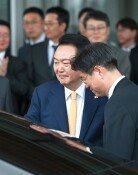Why Are Stock Prices Soaring?
Korea had the highest stock price increase in Asia this year.
Korea ranked eighth among 10 Asian nations in GDP for the first quarter (from January to March).
The Korean Composite Stock Price Index (KCSPI) hit its ceiling in 10 years after a sharp rise.
However, Koreas GDP increase rate for this years first half (from January to June) was two to three percent, meaning what people feel about the real economic situation is at its worst. Stock prices are skyrocketing, but individual investors, often dubbed as ants, are leaving the stock market. Abnormal things keep taking place such as stock prices and interest rates increasing at the same time, which are supposed to be opposites.
What is happening now? Experts say, There are reasons for this.
Worst Economy and Highest Stock Prices
Last weeks KCSPI reached 1,074.22, the highest level in 10 years and eight months since November 1994. Major securities companies came up with a rosy picture that stock prices would rise up to 1,200 by the years end.
In contrast, records of the growth rate and its prospects are dim.
The Korea Development Institute estimated Koreas GDP growth rate in the first half of the year would barely pass three percent and remain at the range of four percent in the second half, with an average rate of 3.8 percent for the year.
Hong Seong-gook, the head of the investment strategy team at Daewoo Securities, said, Stock prices are determined by the business performance of major listed companies such as Samsung Electronics, Hyundai Motors, POSCO and Hynix Semiconductor, adding, Most of these have focused more on export than domestic demand.
Samsung Electronics, Koreas representative company, has market capitalization (calculated by multiplying the current market price of the company`s stock by the total number of shares outstanding) taking up 18 percent of the total. Given its repercussions on stock prices of partner companies, it affects the overall stock price fluctuation by about 30 percent.
As the polarization of low domestic demand vs. export turnaround deepens, it means the growth rate and stock prices will have a wider gap.
In addition, stock prices are leading indicators of the economy in the future. Even under a bad economy, economic recovery signs would raise stock prices.
Higher stock prices and the exit of the ants
This month, stock prices increased from 1,018.02 to 1,074.22. By contrast, during this period, the stock volume sold by individual investors was higher than the amount they bought, reaching 1.449 trillion won (net sales). Recent rises in stock prices were due to massive purchases by foreign investors.
In the past, when stock prices hit above 1,000, the so-called, ajumma group composed of married women, turned up on securities floors, carrying their babies, and showed their bankbooks, saying, Just buy any stocks. It is no longer true now.
Researcher Kim Hak-gyun at Good Morning Shinhan Securities analyzed, It is not a tactical retreat for arbitraging with higher stock prices, but the exit of individual investors from the stock market.
Lee Jong-Woo, head of the research center at Hanwha Securities said, Individuals are leaving the stock market these days, which is very mysterious, adding, The bad experience of the past since 1989, where prices hit above 1,000 and then plummeted by half seems to have acted as learning effect.
Do interest rates and stock prices rise together? -
Interest rates rising together with stock prices are seen in Korea and the U.S. at the same time.
The interest rate of government bonds with three-year-maturity terms, which is the market interest rate in Korea, rose from 3.95 percent as of July 1 to 4.22 percent on July 19, and decreased to 4.03 percent on July 22.
Generally, rising interest rates are bad for stock prices.
Nevertheless, the two rising together results from the prospects for an economic turnaround.
The team head, Hong Seong-gook, said, When interest rates are overall low, interest rates and stock prices rise together in the early recovery stage, adding, Recent interest rate rises are signaling that small and medium companies, mostly domestic demand-oriented, seem to turn around in the latter half of the year, which is good for stock prices.
Kwang-Hyun Kim kkh@donga.com







